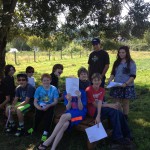 Research: Middle school is a fascinating time in the course of child development. During this period, the section of the brain that’s in charge of organizing, decision-making, analyzing, and judging, is in the process of reorganization. This means that the part of the brain that monitors emotions is in charge of where information goes, which can spell trouble for learning. Author Heather Wolpert-Gawron underlines the importance of having teachers who understand and enjoy middle schoolers during this years. Teachers who can tap into their need to socialize and see their natural self-absorption as an interest to work with will be most successful. Humor, productive feedback, flexibility, and support are crucial during this period.
Research: Middle school is a fascinating time in the course of child development. During this period, the section of the brain that’s in charge of organizing, decision-making, analyzing, and judging, is in the process of reorganization. This means that the part of the brain that monitors emotions is in charge of where information goes, which can spell trouble for learning. Author Heather Wolpert-Gawron underlines the importance of having teachers who understand and enjoy middle schoolers during this years. Teachers who can tap into their need to socialize and see their natural self-absorption as an interest to work with will be most successful. Humor, productive feedback, flexibility, and support are crucial during this period.
Practice: Our middle school program encompasses the 7th and 8th grades and is all about keeping our students engaged and preparing them for high school. Seventh graders spend 4 days at SC and Fridays at our high school campus, where they start to gain familiarity with the environment, staff, and students. Our 8th graders make the full transition to the high school, where they take courses with their cohort and begin to interact with the upperclassmen. In preparation for a successful high school experience, they take a personalized study skills class and are taught school guidelines and cultural expectations during this very formative year. Our middle school teachers are rock stars! They love this squirrely bunch and even travel back and forth between the two campuses to maintain continuity.





 Research: October is
Research: October is  Research: Research on the brain and in education clearly shows that many of the practices held tightly by traditional schools are flawed and even harmful to continue. Even though we can all see a desperate need for change, schools remain status quo, with rigid structures and a focus on norms, efficiency, obedience, and passive learning. Marilyn Ferguson described the need for a paradigm shift in education in her classic book,
Research: Research on the brain and in education clearly shows that many of the practices held tightly by traditional schools are flawed and even harmful to continue. Even though we can all see a desperate need for change, schools remain status quo, with rigid structures and a focus on norms, efficiency, obedience, and passive learning. Marilyn Ferguson described the need for a paradigm shift in education in her classic book,
 Research: The
Research: The